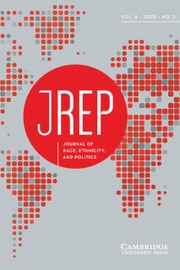No CrossRef data available.
Article contents
Narratives of Racial Duty: Competitive Reality Television Series as Sites for Studying Racialized Social Obligations and Black Group-Based Decision-Making
Published online by Cambridge University Press: 31 August 2023
Abstract
How do Black Americans practice a politics of racial group uplift while balancing their individual material interests? Traditionally, scholars have drawn on linked fate theory. However, more recent work argues that Black Americans remain politically unified because they feel race-based social pressure to conform more than a sense of linked fate. Employing a novel research design, I use the competitive reality television series, Survivor, to observe and analyze Black group-based decision-making. Through an inductive thematic content analysis of 13 Survivor episodes, I identified five themes in Black players’ discussions of racialized social obligations when playing the game—what I call narratives of racial duty. Claims that emerged in this storytelling suggested that similar to the political world, Black Survivor contestants were keenly aware of the racialized social obligations for them as contestants in the game. For some, this reality felt like a burden. For others, it presented an opportunity. These reactions led some Black players to work together and others to construct a rationale for defecting from race-based alliances. I conclude by making the case that analyzing entertainment programs offers race and politics scholars a new site for identifying common scripts used to adhere to (and sidestep) racialized social norms.
Keywords
- Type
- Research Article
- Information
- Copyright
- © The Author(s), 2023. Published by Cambridge University Press on behalf of The Race, Ethnicity, and Politics Section of the American Political Science Association




